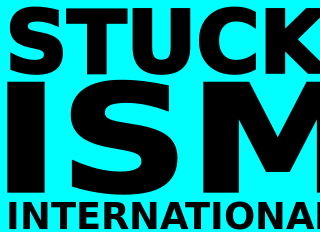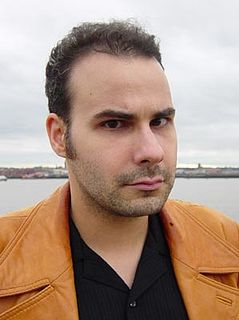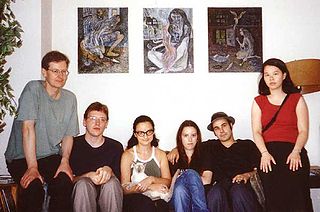Related Research Articles

Stanley Kubrick was an American film director, producer, screenwriter, and photographer. He is frequently cited as one of the greatest filmmakers in cinematic history. His films, which are mostly adaptations of novels or short stories, cover a wide range of genres, and are noted for their realism, dark humor, unique cinematography, extensive set designs, and evocative use of music.

Stuckism is an international art movement founded in 1999 by Billy Childish and Charles Thomson to promote figurative painting as opposed to conceptual art. By May 2017 the initial group of 13 British artists had expanded to 236 groups in 52 countries.
Remodernism revives aspects of modernism, particularly in its early form, and follows postmodernism, to which it contrasts. Adherents of remodernism advocate it as a forward and radical, not reactionary, impetus.
New Wave is a French art film movement which emerged in the late 1950s. The movement was characterized by its rejection of traditional filmmaking conventions in favor of experimentation and a spirit of iconoclasm. New Wave filmmakers explored new approaches to editing, visual style, and narrative, as well as engagement with the social and political upheavals of the era, often making use of irony or exploring existential themes. The New Wave is often considered one of the most influential movements in the history of cinema.
An underground film is a film that is out of the mainstream either in its style, genre, or financing.

Jesse Richards is a painter, filmmaker and photographer from New Haven, Connecticut and was affiliated with the international movement Stuckism. He has been described as "one of the most provocative names in American underground culture," and "the father of remodernist cinema."

The Trials of Oscar Wilde, also known as The Man with the Green Carnation and The Green Carnation, is a 1960 British film based on the libel and subsequent criminal cases involving Oscar Wilde and the Marquess of Queensberry. It was written by Allen and Ken Hughes, directed by Hughes, and co-produced by Irving Allen, Albert R. Broccoli and Harold Huth. The screenplay was by Ken Hughes and Montgomery Hyde, based on the play The Stringed Lute by John Furnell. The film was made by Warwick Films and released by United Artists.

Remodernist film developed in the United States and the United Kingdom in the early 21st century with ideas related to those of the international art movement Stuckism and its manifesto, Remodernism. Key figures are Jesse Richards and Peter Rinaldi.

The Stuckism art movement was started in London in 1999 to promote figurative painting and oppose conceptual art. This was mentioned in the United States media, but the first Stuckist presence in US was not until the following year, when former installation artist, Susan Constanse, founded a Pittsburgh chapter.

An art manifesto is a public declaration of the intentions, motives, or views of an artist or artistic movement. Manifestos are a standard feature of the various movements in the modernist avant-garde and are still written today. Art manifestos are sometimes in their rhetoric intended for shock value, to achieve a revolutionary effect. They often address wider issues, such as the political system. Typical themes are the need for revolution, freedom and the implied or overtly stated superiority of the writers over the status quo. The manifesto gives a means of expressing, publicising and recording ideas for the artist or art group—even if only one or two people write the words, it is mostly still attributed to the group name.

Stuckist Photographers are photographers who develop the values of the Stuckism art painting movement into film and photography. Some of them are in a group called the Stuckist Photographers.
Free Cinema was a documentary film movement that emerged in the United Kingdom in the mid-1950s. The term referred to an absence of propagandised intent or deliberate box office appeal. Co-founded by Lindsay Anderson with Karel Reisz, Tony Richardson and Lorenza Mazzetti, the movement began with a programme of three short films at the National Film Theatre, London, on 5 February 1956. The programme was such a success that five more programmes appeared under the ‘Free Cinema’ banner before the founders decided to end the series. The last event was held in March 1959. Three of the screenings consisted of work from overseas filmmakers.
Mumblecore is a subgenre of independent film characterized by naturalistic acting and dialogue, low-budget film production, an emphasis on dialogue over plot, and a focus on the personal relationships of people in their 20s and 30s. Filmmakers associated with the genre include Andrew Bujalski, Lynn Shelton, Mark Duplass, Jay Duplass, Greta Gerwig, Aaron Katz, Joe Swanberg, and Ry Russo-Young. In many cases, though, these directors reject the term.

Nicholas Watson is a writer and filmmaker. He co-founded the New Haven Stuckist art group.
Harris Smith is an American filmmaker, media critic and essayist from New York City. He is one of the founding members of the Remodernist film movement and was a participating member of the first comprehensive Remodernist exhibition in the United States, Addressing the Shadow and Making Friends with Wild Dogs: Remodernism.

RiP!: A Remix Manifesto is a 2008 open-source documentary film about "the changing concept of copyright" directed by Brett Gaylor.
Dogme 95 was a filmmaking movement started in 1995 by the Danish directors Lars von Trier and Thomas Vinterberg, who created the "Dogme 95 Manifesto" and the "Vows of Chastity". These were rules to create films based on the traditional values of story, acting, and theme, and excluding the use of elaborate special effects or technology. It was supposedly created as an attempt to "take back power for the directors as artists", as opposed to the studio. They were later joined by fellow Danish directors Kristian Levring and Søren Kragh-Jacobsen, forming the Dogme 95 Collective or the Dogme Brethren. Dogme is the Danish word for dogma.
Rouzbeh Rashidi is an Iranian avant-garde filmmaker associated with the Remodernist film movement.
Cine Foundation International is London-based non-profit film company and human rights NGO "aiming to 'empower open consciousness through cinema'". The foundation was formed in December 2010 by American filmmaker Jesse Richards, founder of the Remodernist film movement, South Korean film critic Blue Un Sok Kim and Tobias Morgan, formerly the developer of "The Garage" on Mubi.
Slow cinema is a genre of art cinema film-making that emphasizes long takes, and is typically characterised by a style that is minimalist, observational, and with little or no narrative. It is sometimes called "contemplative cinema". Examples include Ben Rivers' Two Years at Sea, Michelangelo Frammartino's Le Quattro Volte, Nili Portugali's And the alley she whitewashed in light blue and Shaun Wilson's film 51 Paintings.
References
- ↑ Nash, Cara. "Cinema with soul", Filmink, February 25, 2010 Archived March 1, 2010, at the Wayback Machine Retrieved February 28, 2010
- ↑ Richards, Jesse. "International Alliance of Remodernist Filmmakers", When the Trees Were Still Real, August 25, 2009. Retrieved February 28, 2010.
- ↑ "Cinema with soul", Filmink, February 25, 2010 Archived March 1, 2010, at the Wayback Machine Retrieved February 28, 2010
- 1 2 3 "Remodernist Film", MungBeing, October 4, 2009 Retrieved February 28, 2010